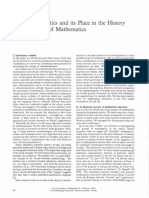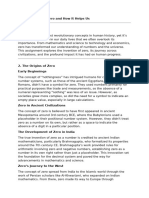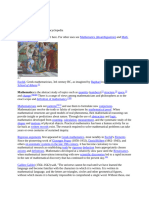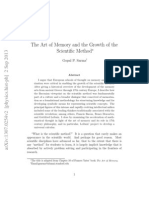0 ratings0% found this document useful (0 votes)
26 views13 Million Pseudoscience Numerology Greek Mathematics
Numbers have cultural significance beyond their practical uses, with certain numbers like 13 viewed as unlucky in Western society. Though now seen as pseudoscience, numerology and the mystical meanings of numbers were historically important in ancient and medieval thought, influencing early Greek mathematics. In the 19th century, mathematicians began developing abstract concepts that generalized the properties of numbers, such as hypercomplex numbers extending the complex number system, with number systems now viewed as specific examples of more general algebraic structures like rings.
Uploaded by
Arjel JamiasCopyright
© © All Rights Reserved
Available Formats
Download as DOCX, PDF, TXT or read online on Scribd
0 ratings0% found this document useful (0 votes)
26 views13 Million Pseudoscience Numerology Greek Mathematics
Numbers have cultural significance beyond their practical uses, with certain numbers like 13 viewed as unlucky in Western society. Though now seen as pseudoscience, numerology and the mystical meanings of numbers were historically important in ancient and medieval thought, influencing early Greek mathematics. In the 19th century, mathematicians began developing abstract concepts that generalized the properties of numbers, such as hypercomplex numbers extending the complex number system, with number systems now viewed as specific examples of more general algebraic structures like rings.
Uploaded by
Arjel JamiasCopyright
© © All Rights Reserved
Available Formats
Download as DOCX, PDF, TXT or read online on Scribd
You are on page 1/ 1
Besides their practical uses, numbers have cultural significance throughout the
world.[7][8] For example, in Western society, the number 13 is regarded as
unlucky, and "a million" may signify "a lot."[7] Though it is now regarded
as pseudoscience, numerology, the belief in a mystical significance of numbers,
permeated ancient and medieval thought.[9] Numerology heavily influenced
the development of Greek mathematics, stimulating the investigation of many
problems in number theory which are still of interest today.[9]
During the 19th century, mathematicians began to develop many different
abstractions which share certain properties of numbers and may be seen as
extending the concept. Among the first were the hypercomplex numbers,
which consist of various extensions or modifications of the complex number
system. Today, number systems are considered important special examples of
much more general categories such as rings and
You might also like
- Taming The Infinite - The Story of Mathematics (PDFDrive)No ratings yetTaming The Infinite - The Story of Mathematics (PDFDrive)385 pages
- D'Ambrosio, U. (1985) - Ethnomathematics and Its Place in The History and Pedagogy of Mathematics. For The Learning of Mathematics, 5 (1), 44-48100% (1)D'Ambrosio, U. (1985) - Ethnomathematics and Its Place in The History and Pedagogy of Mathematics. For The Learning of Mathematics, 5 (1), 44-485 pages
- The Story of Mathematics: From creating the pyramids to exploring infinityFrom EverandThe Story of Mathematics: From creating the pyramids to exploring infinity4/5 (8)
- Mathematics (from Greek: μάθημα, máthēma, 'knowledge, study, learning') includesNo ratings yetMathematics (from Greek: μάθημα, máthēma, 'knowledge, study, learning') includes1 page
- The Invention of Zero and How It Helps Us - School AssignmentNo ratings yetThe Invention of Zero and How It Helps Us - School Assignment3 pages
- History of Mathematics & Its ApplicationsNo ratings yetHistory of Mathematics & Its Applications18 pages
- Basic Calculus C.E.R.A.E: History of MathematicsNo ratings yetBasic Calculus C.E.R.A.E: History of Mathematics5 pages
- What Is Mathematics?: 1 More Than ArithmeticNo ratings yetWhat Is Mathematics?: 1 More Than Arithmetic7 pages
- Mathematics (from Greek: μάθημα, máthēma, 'knowledge, study, learning') includesNo ratings yetMathematics (from Greek: μάθημα, máthēma, 'knowledge, study, learning') includes2 pages
- History of Mathematics & Its ApplicationsNo ratings yetHistory of Mathematics & Its Applications18 pages
- Mathematics: Mathematics (Disambiguation) Math (Disambiguation)No ratings yetMathematics: Mathematics (Disambiguation) Math (Disambiguation)4 pages
- Who Invented Math and When?: Students Have A Complicated Relationship With MathematicsNo ratings yetWho Invented Math and When?: Students Have A Complicated Relationship With Mathematics6 pages
- Mathematics Education Philosophy of Mathematics100% (1)Mathematics Education Philosophy of Mathematics11 pages
- Perspectives On Mathematics: Undar ArukkaiNo ratings yetPerspectives On Mathematics: Undar Arukkai2 pages
- The History of Mathematics Is A Long and Winding OneNo ratings yetThe History of Mathematics Is A Long and Winding One2 pages
- EVOLUTION AND GLOBAL ADOPTION OF THE INDO-ARABIC NUMERICAL SYSTEM_A QUALITATIVE ASSESSMENT OF ITS ORIGINS AND INFLUENCE (1)No ratings yetEVOLUTION AND GLOBAL ADOPTION OF THE INDO-ARABIC NUMERICAL SYSTEM_A QUALITATIVE ASSESSMENT OF ITS ORIGINS AND INFLUENCE (1)10 pages
- Architectural Toys The Construction of ANo ratings yetArchitectural Toys The Construction of A15 pages
- Set Theory and Logic: University of ZimbabweNo ratings yetSet Theory and Logic: University of Zimbabwe78 pages
- "Teaching Them To - Obey!" "Knowledge Puffs Up": For The Work of Ministry, For The Edifying of The Body of ChristNo ratings yet"Teaching Them To - Obey!" "Knowledge Puffs Up": For The Work of Ministry, For The Edifying of The Body of Christ3 pages
- Session 1 - His Work / Our Work: The Overall Goal / PictureNo ratings yetSession 1 - His Work / Our Work: The Overall Goal / Picture5 pages
- Intro: Every Joint Supplies, According To The Effective Working by Which Every Part Does Its Share, CausesNo ratings yetIntro: Every Joint Supplies, According To The Effective Working by Which Every Part Does Its Share, Causes2 pages
- Sportaccord Association Football Athletics Cycling Tennis Equestrian SportsNo ratings yetSportaccord Association Football Athletics Cycling Tennis Equestrian Sports1 page
- Lærɪŋks/ Organ Neck Tetrapods Trachea Vocal Folds Pitch Phonation Pharynx Esophagus Ancient GreekNo ratings yetLærɪŋks/ Organ Neck Tetrapods Trachea Vocal Folds Pitch Phonation Pharynx Esophagus Ancient Greek1 page







































































